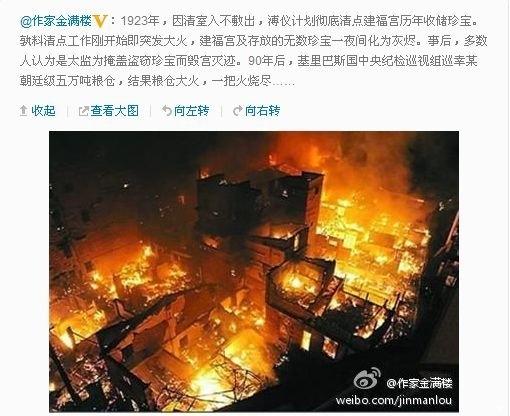A serious fire burned through a major grain base in Heilongjiang Province on Friday, wiping out 78 grain bins and nearly 52,000 tons of corn and rice.
The granary belongs to the state-owned China Grain Reserves Corporation or Sinograin, and was holding over 150,000 tons of grain when the fire happened.
Although around 1,600 workers were sent to put out the blaze, hot and windy weather apparently hampered their response. The fire burned for 20 hours before it was put out.
State media put preliminary estimates for the damage at around 100 million yuan (about US $16.3 million), and reported that local authorities had attributed the fire to a short circuit.
Five days before the fire, central authorities had dispatched special inspection teams to several provinces to tackle corruption, including to Sinograin, leading many netizens to question the official verdict for the cause of the fire. The corporation is widely known to have kept fake reports for years with some silos even being empty.
According to an investigative report published by web portal Sina, the firefighting department of Sinograin is required to do daily inspections, with a comprehensive inspection done every season, in addition to monthly inspections of areas that are most susceptible to fire. The idea that such a serious fire still occurred by accident is leaving many skeptical.
Qinghua Qinpeng, a netizen on microblogging service Sina Weibo, said: “As a professional consultant, I know very well that every industry has its standards. Fire prevention is the most important factor in designing large-scale granaries. There are strict requirements for how big the grain piles can be and their distances from each other, in addition to building firewalls as dividers. So to have a few grain piles catch on fire in a large-scale granary is possible, but to have tens of them catch on fire at once, that is very rare, unless...”
Some netizens likened the incident to one depicted in a popular television series about corrupt local officials in the Qing Dynasty, who burned down their barns to destroy evidence before an imperial inspector arrived to investigate their area’s food supplies.
One Internet user said: “That was really clever. The fire put Xi Jinping’s imperial envoy off track, and also destroyed the chaotic records in the barns.”
Another pointed out that the fire should have been easy to put out because it would have spread slowly. “The grains are not flammable and cannot spontaneously combust. Also, the fire should not spread that easily.”
Several netizens commented that the “imperial envoys” might have been “threatened by a tiger” or “corrupted by flies,” mentioning the terms used by regime leader Xi Jinping to refer to corrupt high- and low-level officials.
Nine Sinograin staff were charged with negligence on Monday, including the granary director.
On June 2, another major fire occurred at Petro China Dalian, a subsidiary of the state-owned oil and gas company China National Petroleum Corporation. According to state media, the fire occurred at around 2:20pm local time in Dalian City, Liaoning Province due to a diesel tank explosion. Later, two tanks containing residuals of diesel fuel also exploded. Two people were missing and two people were injured. The fire was extinguished at around 4pm, but thick smoke was still belching forth from the site.
This is not the first time that explosions have occurred at the company. In 2010, an oil pipeline explosion occurred at the free trade zone, resulting in serious marine pollution. In 2011, a diesel fuel tank containing 800 tons of fuel exploded, but there were no casualties.
Research by Jane Lin and Ariel Tian. Translation by Frank Fang.




